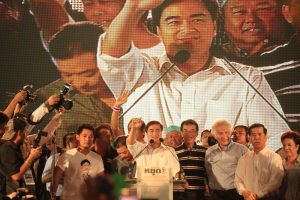When we think of Democrat or Democratic parties elsewhere, we normally imagine parties somewhere on the left wing of the political spectrum: parties guided by principles such as democracy promotion, economic liberalism, human rights, and feminism. The Democrat Party of Thailand, however, has moved very much in the opposite direction over the past 15 years. Its party leaders and older elites joined the protests against the elected government in 2014, which culminated in a military coup in May of that year, and supported the military-led government in forming a government after the 2019 election. At the time of the party’s founding in 1946, in the early years of democratic development in Thailand, the Democrats represented a new hope of democratic prosperity. In recent years, however, the party has abandoned its old traditions and leaned toward authoritarianism.
The Democrats’ disastrous defeat at the 2019 election, particularly in its traditional strongholds in the Upper South and Bangkok, revealed the extent of the party’s political decline. Numerous well-known Democrat MPs who had dominated their constituencies for decades were defeated by other major political parties, including the military-backed Palang Pracharath Party (PPRP) and the disbanded opposition party Future Forward.
After joining the ruling coalition in 2019, the Democrat Party failed to attract more political support and maintain its existing members. As suggested by its dismal showing in this week’s Bangkok gubernatorial election, this has weakened the party’s organizational structures and may threaten its survival over the long term. The decline of the Democrats can be explained by a combination of factors, including the control of the party by an old-elite faction, the failure to recruit capable young candidates, and its ambiguous political positions. These factors are likely to prevent the party from adapting to a changing political landscaping and reversing its fortunes in future elections.
First, the old elite faction that has controlled the Democrats for a very long time is perhaps the main obstacle to party adaptation. These old elite factions include the southern faction, led by the party’s current leader and minister of commerce, Jurin Laksanawisit, along with other long-time southern politicians, including former Prime Minister Chuan Leekpai, and the technocrat faction, led by Khunying Kalaya Sophonpanich. The power of these old elites in the party prevents the possibility of the new generation to grow in the organization. This also diminishes the chance of party adaptation to political changes.
Second, the lack of efforts to develop a new generation of party leaders has prevented ordinary young people from joining the party. The Democrats are well known for establishing a school for democratic development among the young generation. For several years, the party organized a Young Democrat Program, or Yuwa Prachathipat, but young participants lacking political connections or membership in an established political family have a limited chance to be selected as electoral candidates.
Before the 2019 election, the party launched the New Dem Scheme, a group of 21 young party members led by Parit Wacharasindhu, a nephew of the former party leader and prime minister of Thailand, Abhisit Vejjajiva, with a hope to promote the young blood in the party. After the election, however, when the members of the group were defeated by other parties, the group was disbanded.
Third, the Democrats’ failure to capture votes outside its established strongholds has weakened the party’s standing. The party won seats in most of the provinces of the Upper South, both at the national and local levels. The party, however, has failed to secure any seats in other regions. This failure is partly a result of its ambiguous policy stances, as well as the party’s broader direction. Before the 2014 military coup, the Democrat Party’s policy platform was based on a populism that was similar to that of the parties aligned with former Prime Minister Thaksin Shinawatra. But the similarity of this populist program did not help the party defeat its rivals, such as the pro-Thaksin Pheu Thai Party, which successfully implemented a populist policy when it was in power.
Aside from lacking a clear policy platform, the Democrats frequently delivered crowd-pleasing statements with a hope of garnering votes right before the elections. For instance, then Democrat leader and former Prime Minister Abhisit Vejjajiva released a statement a week before the 2019 election, saying that he would not support the 2014 coup leader, Gen. Prayut Chan-o-cha, as prime minister after the election. This statement threatened the party’s support, particularly in the Democrats’ strongholds in Bangkok and the Upper South. Instead of attracting more votes, it led to Abhisit’s subsequent resignation as the party’s leader.
Prior to the 2014 coup, the Democrats has controlled more than 200 party branches. That number has fallen to less than 100 branches since the 2019 election. Moreover, these branches do not function effectively in recruiting candidates and organizing regular political activities in remote constituencies. Many branches are located in candidates’ homes and some exist only on paper. Many operate only during the election campaign period. If these Democrat branches functioned effectively and supported the party in remote areas, they would play a vital role in promoting party affiliation among voters across the country, which would lead to the development of party institutionalization.
The Democrats, the oldest party in Thailand, has recently faced many challenges to its survival. A large number of its prominent politicians have split to other parties or set up new ones. The party actually tried to restructure itself in 2013, but the plan failed due to intra-party infighting. This may be a significant time for the Democrats to reconsider their organizational structure again, in order to prevent a further loss of support, or even the party’s extinction, at the next national election, expected to be held in 2023.

































